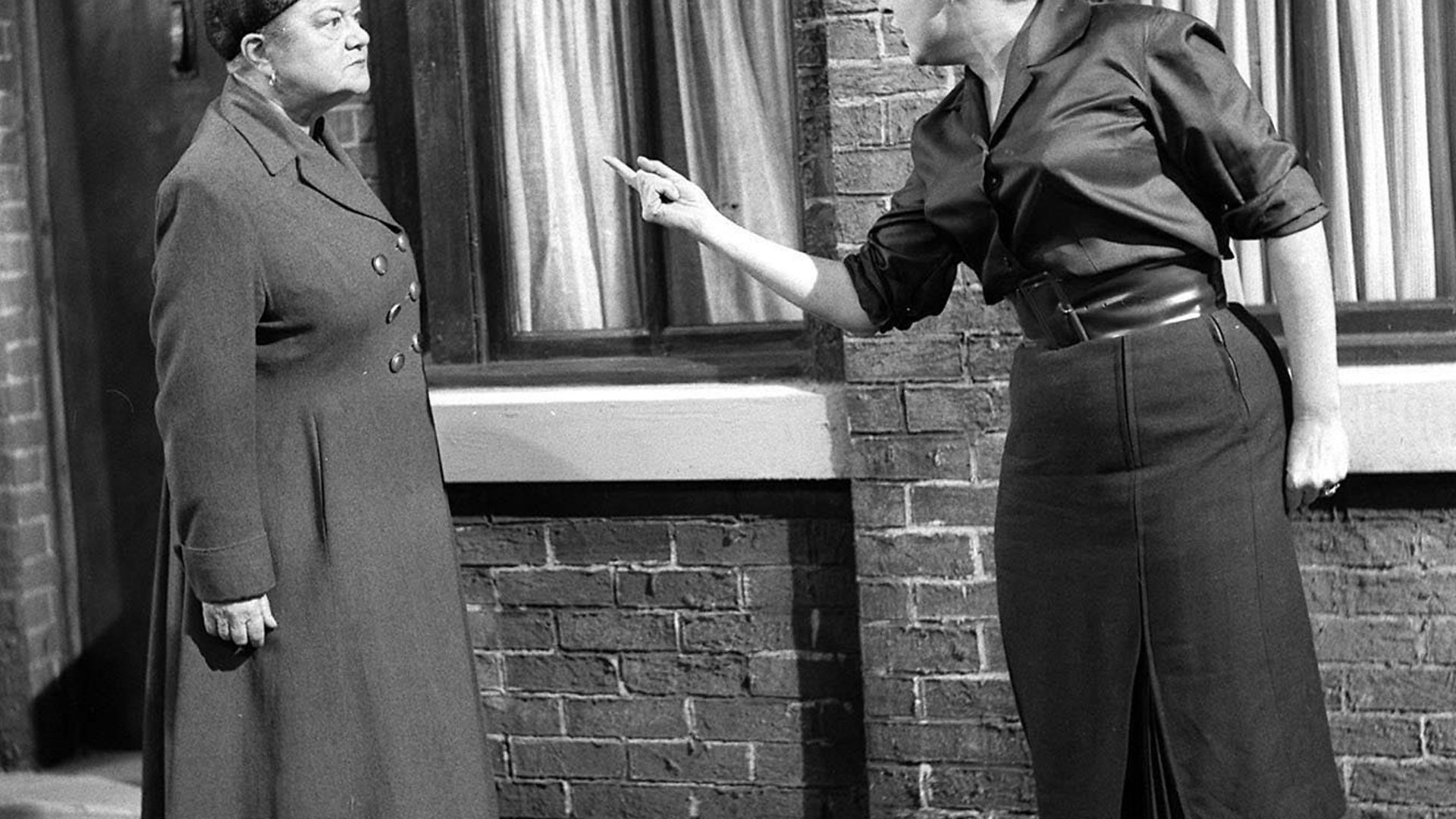
Binge watchers dispute whether Breaking Bad, The Sopranos, Mad Men, or Game of Thrones was the greatest-ever series. But what if the most true-to-life and joyously comic TV drama was, at least for its first 15 years or so, the humbler, seemingly ultra-familiar Coronation Street?
Conceived by scriptwriter Tony Warren, the soap opera about the residents of a cobbled, terraced street in a town based on Salford was first broadcast on December 9, 1960.
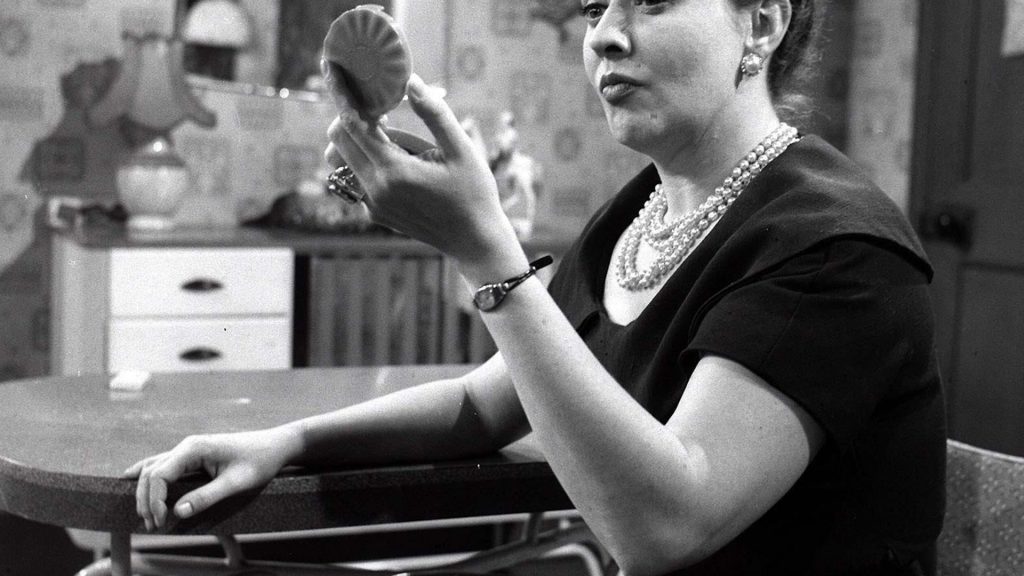
It continued in a twice weekly format that allowed for high artistry in scriptwriting and performance. Today’s five-a-week assembly line production rate, with constantly amped-up violence to waken drowsy punters, cannot compete with the show’s original achievements.
So old episodes, available online, are revelatory. Even in its less aggressive beginnings, Coronation Street was still what the anthropologist Kate Fox described in her book Watching the English as an exercise in watching people who are “making an even more spectacularly dysfunctional mess of their lives than we are.”
There were other motivations, too. In 1975, the poet laureate Sir John Betjeman likened Coronation Street to Dickens’ Pickwick Papers. The implied life-enhancing characterisation dominated for years. During the first episode in December 1960, the bell on a shop door clangs when the archetypal harridan Ena Sharples enters, as if marking the start of a boxing match.
Ena, a British bulldog as played by the actress Violet Carson, launches into a pugnacious monologue about burial ceremonies and liturgical music that prefigures Alan Bennett’s plays.
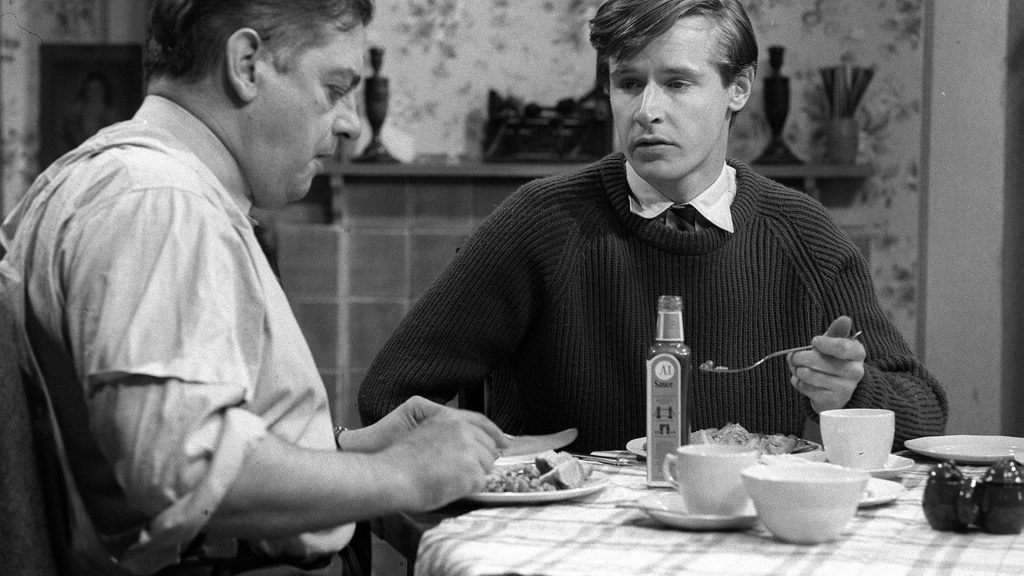
Without pausing for breath, Carson, in real life a veteran singer and pianist on radio broadcasts, interjects about pastries on display: “Are them fancies today’s? I’ll have half a dozen, and no éclairs.” She repeats, “No éclairs.”
Nancy Banks-Smith, the veteran Guardian television critic who heroically chronicled happenings on the Street, mused about why Sharples was so decisive about her pastry order, concluding that as a “God-fearing woman,” Ena, felt that éclairs had an “erotic connotation”.
Banks-Smith concluded that the show was a “vision of quite astonishing truth. I thought Coronation Street was a documentary, for I grew up in a pub like that with people exactly like that.”
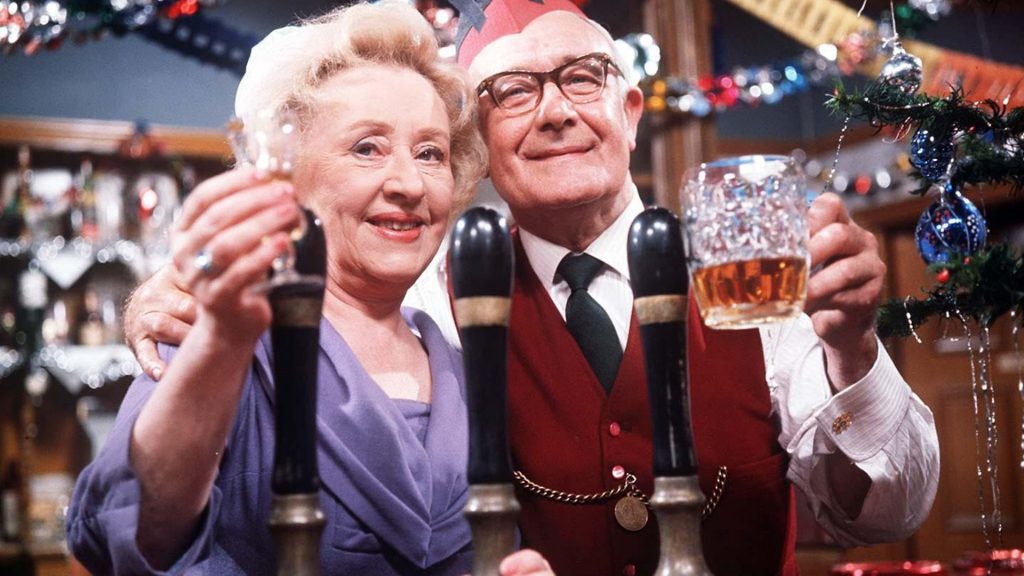
She adds about Ena’s slanging matches with the voluptuous Elsie Tanner (Pat Phoenix): “Their collisions loosened your back teeth.”
One such encounter from a January 1965 episode is capped by the ironic entrance of a Mission band trudging down the street playing Onward Christian Soldiers as peace is restored to the street by Leonard Swindley, committee chair of the Glad Tidings Mission Hall.
Swindley was played by Arthur Lowe, who majestically showed the humane side of such unctuous, self-important characters.
Another public battle royale on Corrie was between Elsie Tanner and Hilda Ogden (Jean Alexander), known for her ever-present curlers, headscarf and pinny. A newcomer to the Street asks the local intellectual Ken Barlow (Roache) if such street fights occur often. He replies, “Ehhh, only every three days. It’s a men’s free for all on Sunday, sort of a local custom, you might say.”
Corrie is often applauded for its strong female characters, yet at least at its beginnings, the writing for male characters could be just as compelling, whether in free-for-alls or more poignant moments.
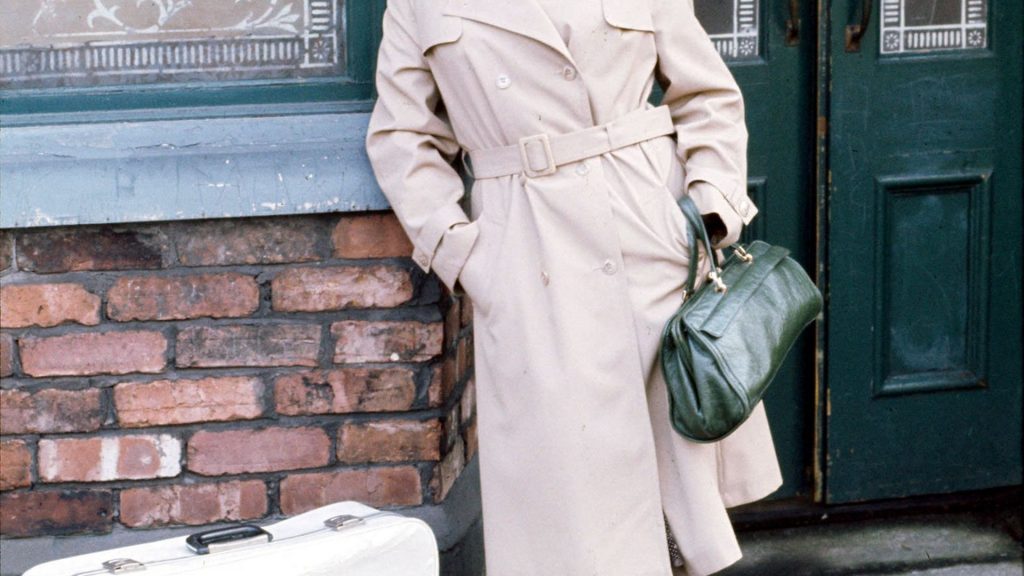
One of the latter was broadcast in March 1961, when Albert Tatlock (Jack Howarth) underwent a physical exam after a health scare. Tatlock raises his shirt, revealing the potato-shaped physique of the 64-year-old actor Howarth, as alternating camera views of his obese upper body, front and back, are accompanied by the doctor’s advice that he move in with his daughter.
Tatlock objects that he has been living on the Street for 40 years and memories from a place of residence constitute a life. That is near the heart of Corrie’s message. The great ghost of narratives past, Dickens himself, later evoked by Betjeman in reference to the show, is surprisingly mentioned by Albert Tatlock: “Mind you, if I could write like that there Charles Dickens, I bet I could write 20 tales about this here street and this city, about all the grand times it’s had and the bad times, and the good folks that have lived here and the other kind as well.”
Tatlock concludes: “I’m like a plant meself, and that’s why I can’t be moved. I’m deep-rooted.”
This final line, with his head bowed to his chest, has an exquisitely moving effect.
Arthur Leslie as Jack Walker, genial landlord of the Rovers Return pub, was equally convincing. Leslie was praised in a May 2005 blog by Ian McKellen for his service to regional theatre, like many of the startlingly emotional and funny elders seen in the first two decades or so of Corrie.
McKellen, who would appear in a brief story line in the Street in May 2005, recalled how in the 1940s, the Frank H. Fortescue Players at the Hippodrome Theatre, Wigan, were directed by the same Arthur Leslie, even then a
“middle-aged character man.” Leslie courageously coped with a rep schedule of “paltry thrillers, light comedies and farces.”
Leslie, Jack Howarth, Violet Carson, and others were veteran actors responding to the spotlight with even more truthfulness than the previously obscure casts of the The Sopranos or Breaking Bad would decades later when galvanized into fame.
Despite their limited notoriety, Corrie’s actors had grandeur. Encountering Doris Speed, the actress who played Jack Walker’s haughty wife Annie, landlady of the Rovers Return, Corrie scriptwriter Paul Abbott noted in the Guardian in March 2016, was “like meeting the Queen”.
As the years passed, the comedy grew more broadly conceived, often without quite the same human resonance. In October 2016, former Corrie scriptwriter Daran Little told the Daily Express about Hilda Ogden, as performed by Jean Alexander: “You knew instantly she was a caricature and that’s what she created, and you knew what to expect.”
Hilda Ogden, her shiftless husband Stan (Bernard Youens), the brash barmaid-turned-landlady Bet Lynch (Julie Goodyear), notoriously untalented cook Deirdre Barlow (Anne Kirkbride), the stolid butcher Fred Elliott (John Savident), and other characters were delightful to watch, as the sharp comic dialogue continued to make an impact.
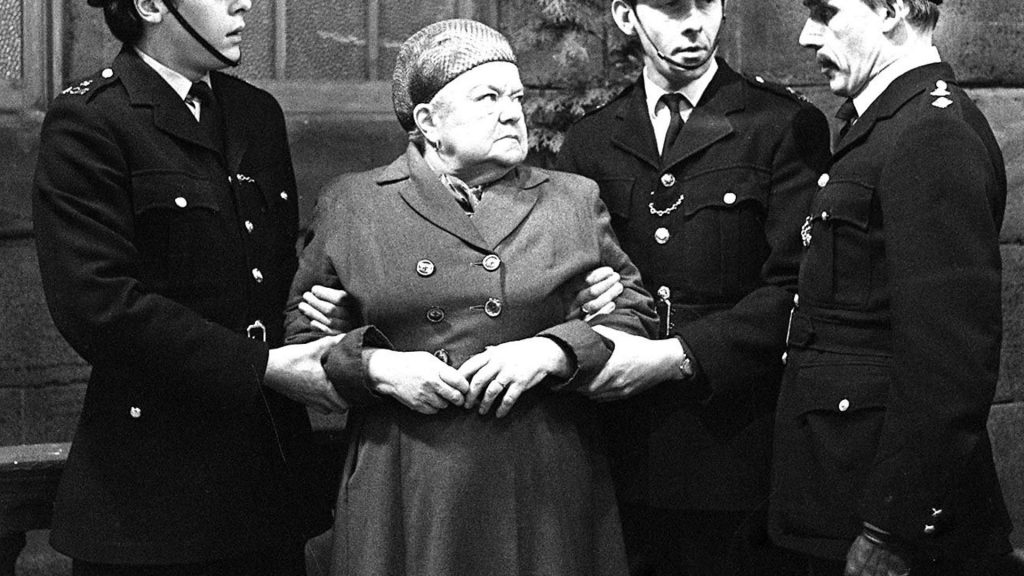
Despite masterful and often emotional moments, including the deaths of beloved characters, especially down-to-earth Vera Duckworth (Liz Dawn), truth gradually receded from the comedy and tragedy of the Street.
It was replaced by measures of domestic violence and hype, if new book 60 Years of Coronation Street (Hamlyn) is any indication. The book is by Abigail Kemp, a Manchester-based journalist and ex-publicist for the series who scripted the official studio tour of the show’s sets as well.
60 Years of Coronation Street has a Disneyfied or touristic tone; we are informed that Corrie is “as much a part of British culture as a nice cuppa, a fish and chip supper or sitting down to the Queen’s speech on Christmas Day”.
Even cursory mention of main characters and plot lines throughout Corrie’s six decades adds up to a dry list, rather than any explanation about the soap’s enduring qualities.
Many previous volumes have covered the same ground, including last year’s souvenir album, Coronation St. Treasures: The Story of the Street in Rare Photographs and Memorabilia (Carlton).
Then there is the ongoing series of Corrie-themed romance novels by Maggie Sullivan (HarperCollins), about the early lives of Elsie Tanner, Annie Walker and Hilda Ogden. The next title, The Land Girls from Coronation Street, is scheduled for publication in February 2021. And the ghost-written memoirs by the show’s stars, some likely qualifying as semi-fictional.
By contrast, one gimlet-eyed viewer of Corrie was Richard Dyer in a book for BFI Publishing (1982). Dyer likened Tony Warren’s championing of working class culture with Richard Hoggart’s The Uses of Literacy (1957), also legitimizing UK proletarian culture.
Beyond any quibbles about cultural significance, Betjeman was essentially correct. Corrie’s combination of brilliant writing and acting made it a genuinely Dickensian achievement, for its first two decades, at least. Some of the hubbub of its more recent years may have partly camouflaged the freshness of this early excellence, making the show into more of a constantly present background noise than an epiphany.
So celebrating Coronation Street at 60 may be done best by marvelling once again at Ena Sharples, Leonard
Swindley, Elsie Tanner, Albert Tatlock, Annie Walker, Hilda Ogden, and the other unforgettable characters of the past, as well as the actors who portrayed them.









